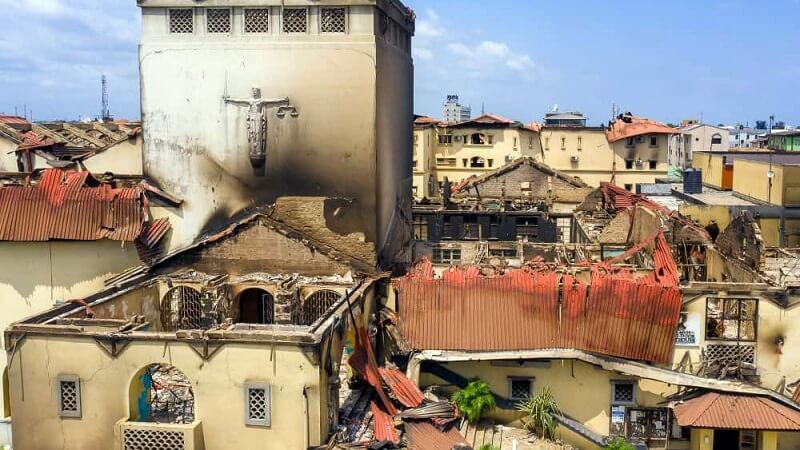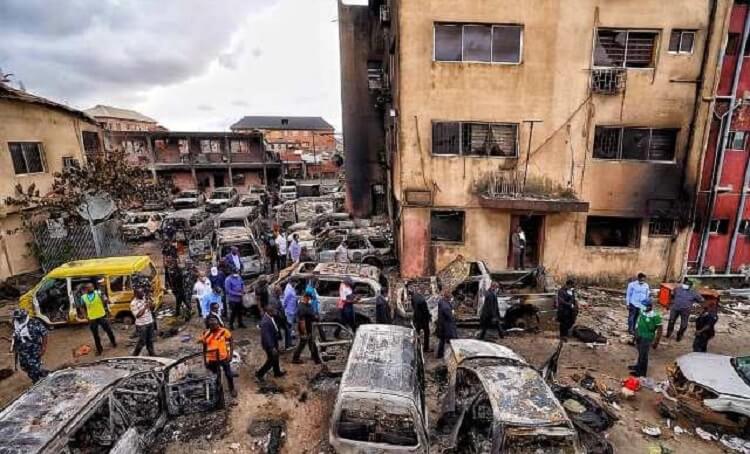Nigeria’s social unrest and the worsening level of insecurity is making it difficult for foreign investors and local investors to risk huge amounts on infrastructural projects over fear of possible rampage, according to stakeholders familiar with the matter.
Nigeria has lost over N1trn to destruction of properties across the country in less than five months to social unrest, experts have said.
Advertisement
Within 14 days from the start of the #EndSARS protest, Lagos Chamber of Commerce and Industry President, Toki Mabogunje, disclosed that Nigeria lost more than N700bn in economic value.
After the #EndSARS protest rampage and looting spree, a total estimate of 205 vital national security assets, corporate facilities and private property were vandalised.
Over 71 public warehouses and 248 private stores witnessed clampdown by angry protesters in 15 states who later hijacked a peaceful protest against police brutality and bad governance.
The states hit by the protests were: Lagos, Edo, Delta, Oyo, Kano, Plateau, Osun, Ondo, Ogun, Rivers, Abia, Imo, Cross River, Akwa Ibom and Ekiti states, as well as the Federal Capital Territory.
Advertisement
Still counting the cost, the management of Lekki Concession Company, the concessionaire of the Lekki Tollgate in Lagos, recently said over N2.5bn losses have been recorded in the last four months.
The Managing Director of LCC, Yomi Omomuwasan, last Monday said the closure of the Admiralty Toll Plaza, Lekki, had worsened the cost.
The International Monetary Fund had said Nigeria’s infrastructure stock of 25 per cent of Gross Domestic Product remains far below the 70 per cent international benchmark.
Nigerian government has intensified calls for private sector participation in infrastructure building as the country’s budget overtime has not favoured infrastructure development.
Lekki Tollgate was built as one of Nigeria’s first Public-Private Partnership arrangements, but the social unrest has stalled the repayment of the loan which is expected to come from the proceeds obtained from toll.
For instance, the LCC is currently indebted to local and foreign creditors to the tune of N11.5bn and $31m respectively. The same firm in 2011 owed commercial banks in Nigeria N24bn and the International Development Bank, $49m.
Advertisement
All these happened amidst the Federal Government ‘s target to generate a total of N493.4bn from the sale or concession of about 36 of its assets across the country.
Muda Yusuf, the Director General of the Lagos Chamber of Commerce and Industry who spoke for the Lagos based chamber on the issue said, investors are scared of ploughing huge amounts in the country’s long term infrastructure projects due to the lingering social unrest and insecurity.
For the LCCI boss, the unrest is already making it difficult for foreign investors to see the country as a safe investment destination for capital infrastructure.
Yusuf said, “The social unrest that we have had in the past few months and even going beyond that, all the insecurity problems in Nigeria in the past three years have had a very negative effect on our perception as a country, especially before foreign investors.
“It is something that will make it difficult to make Nigeria an investment destination of first choice by investors, because what that does is that it aggravates investment risks.
“Because if you are going into an environment and the environment is perceived to be socially unstable, that means that the risk of investing in such an environment will be very high.
Advertisement
“And when you want to invest in such an environment, most times investors will be taking short-term investments. Because when an environment is unstable, you do not want to invest your fund for a long time.
“In order to minimise your exposure to those risks, invariably what we have are investors that are either trading in financial instruments or doing buying and selling, importing and selling. You know all those short short term aspects of investments.
“That kind of investment comes more entrenched in the system as against long term investment in manufacturing, agriculture and maybe processing; in real estate and things like that which is what an economy actually needs to be able to progress and create jobs.
“So, generally, the implication of those things is the kind of perception it creates for the country and more importantly, the perception of risk and if the perception of risk is not favourable, it affects investments. It affects the capacity of the economy to generate wealth, jobs and to even reduce poverty.
“When you are talking of the transformation of an economy, investment is at the hearts of it and if the environment is not conducive for investment, then it will continue to retard the progress of such an economy.”

When contacted, the Infrastructure Concession Regulatory Commission which is the agency responsible for the development and implementation of the Public-Private Partnership framework for the provision of infrastructure services declined to comment on the matter.
The Bureau of Public Enterprise was yet to send a response on the matter as of the time of filing the report.



